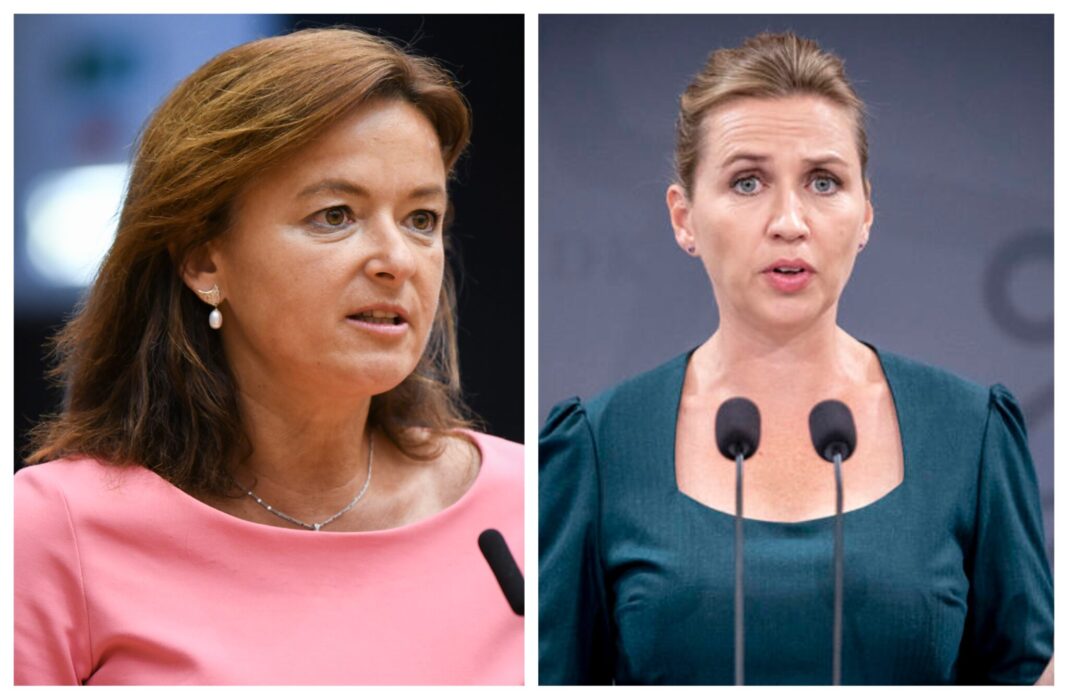By: Sara Kovač / Nova24tv
From now on, migrants in Denmark will have to work to get financial support. For social transfers, immigrants will have to do at least 37 hours of public work a week, the Danish government announced on Tuesday. Given that this is a Social Democratic government; one would expect that related parties within the EU support each other. Obviously, this is not the case, namely the president of the SD party and MEP Tanja Fajon has decided to continue to pursue her pro-migrant position, and has clearly stated that she does not agree with such a policy.
The Danish government, which has set itself a goal of zero asylum applications, said the plan was set up to facilitate the assimilation of migrants into society. “We want to introduce a new work logic where people are obliged to contribute and be useful, but if they cannot find a regular job, they have to work for their allowance,” Prime Minister Mette Frederiksen told reporters. “We have been doing a disservice to many people for too many years, as we have not demanded anything from them,” she added regarding the plan, which has yet to be approved by the legislature.
When one of the tweeters asked SD president Tanja Fajon if she supported Danish measures to transfer such a method to us, she replied that the approach of the Danish Social Democratic government was not close to her and she was worried. “I have already pointed this out in internal discussions and also supported the efforts of the Representation of the European Commission in Slovenia, which examines whether Danish measures are in line with EU law, and a written question from colleagues of the European Parliament in Slovenia #EK on this topic,” she said.
A wave of criticism poured in
As the MEP made it clear in her statement that she did not agree with someone working for money, a wave of criticism poured in in the sense: “Lucky Danes… they have the Social Democrats, who think and act as the mayor of Ilirska Bistrica Rojc who was excluded from the SD party… but with us…!”; “Tanja worries. Because living at the expense of Danish taxpayers is always a right.”; “The Danish Minister of Justice even said that Orban was right in 2015 and that Hungary is a model for the EU in terms of dealing with migrants. Tanja will die from worry.” “Our SD would take EU money from the Danish SD. The Danish SD’s leadership of the government is not to the liking of our SD members. If this does not happen, someone else could come up with the idea that JJ is not so wrong, as he leads our government similarly to the Danish SD, but this must not happen.”
The goal of the Danish government is to integrate 20,000 people
Initially, these rules will apply to those who have had income for three to four years and have not reached a certain level of schooling and knowledge of the Danish language. According to the Danish government, six out of ten women from the Middle East, North Africa and Turkey do not participate in the Danish labour market. The goal of the government plan is to integrate 20,000 people by finding them some form of work through local government offices. “It could be working on the beach to pick up cinders or plastic… (or) helping to accomplish various tasks in the company,” said Employment Minister Peter Hummelgaard. “For us, the most important thing is for people to leave their homes,” he added.
Frederiksen’s government, which has been in power since 2019, has set itself a goal: no asylum applications, which is not yet close to being realised. Only 851 asylum applications were received between January 1st and July 31st this year. According to official statistics, 11 percent of Denmark’s 5.8 million people are immigrants, and 58 percent of them are citizens of a country that Copenhagen classifies as “non-Western”.
When former Minister of Education, Science, Culture, Sports and Development Žiga Turk asked the president of the SD party if he understood her correctly that she was worried because migrants had to work in exchange for help, Fajon replied: “No, Žiga. You do not understand correctly.” This response by the SD party president has further confused people, as most understand her critical comment in the sense that she is concerned that migrants will have to do something to receive the money. Given that it is more than clear that the failed integration of migrants from culturally different backgrounds has brought a whole host of problems to countries with large migrant populations, it is only logical that Denmark wants the trend to reverse and that those who are in the country are adjusted to the majority population if they already live at their expense.
The Slovenian Social Democrats more than obviously support a different practice. Given that it is common for related parties in the EU to support each other, this move is undoubtedly unusual. Anyway, obviously on the European floor we will not only witness conflicts between the center-right and the left, but even the internal struggle. Will there be a common migrant policy in the European Union or will we continue to witness a bunch of separate statements that contribute to undermining the influence and reputation of the European Union?!

